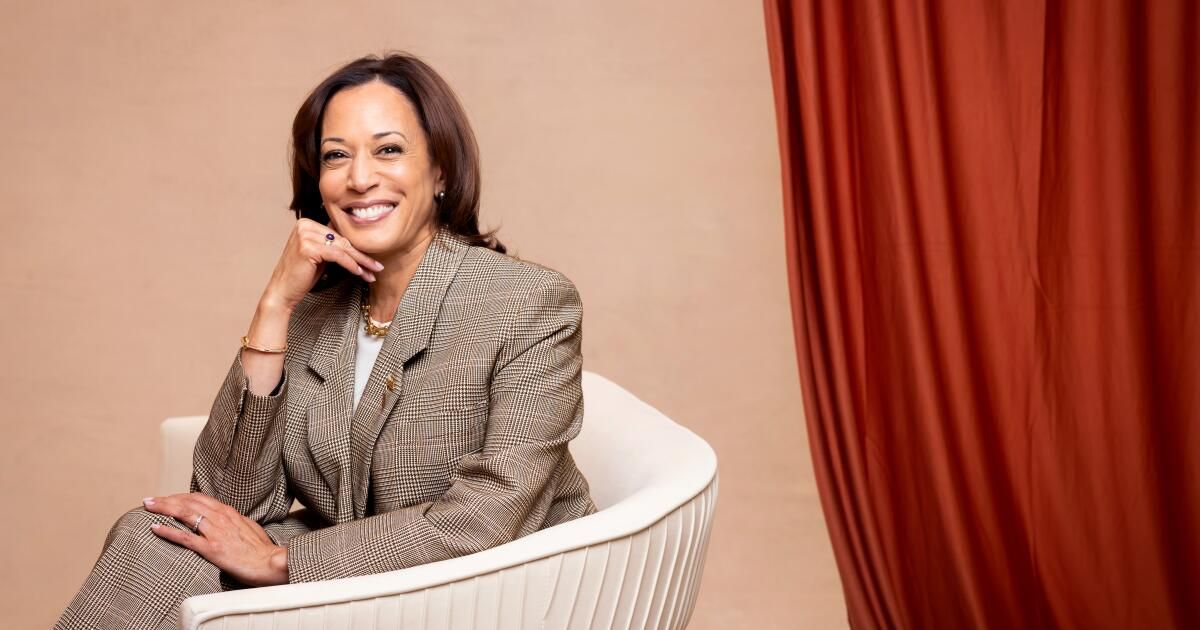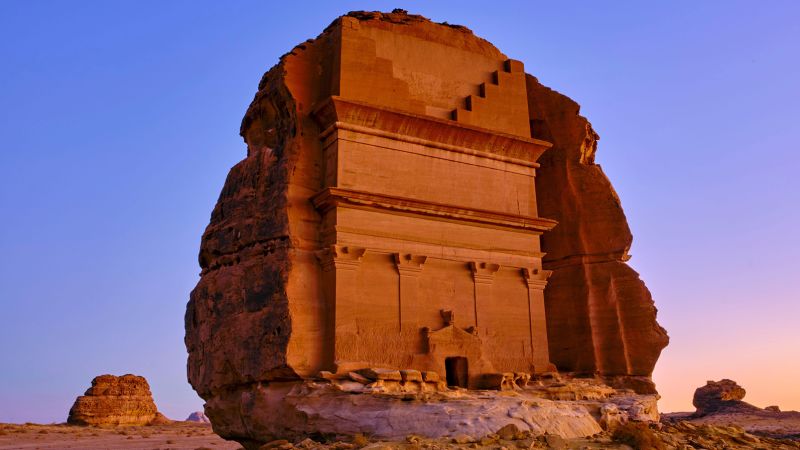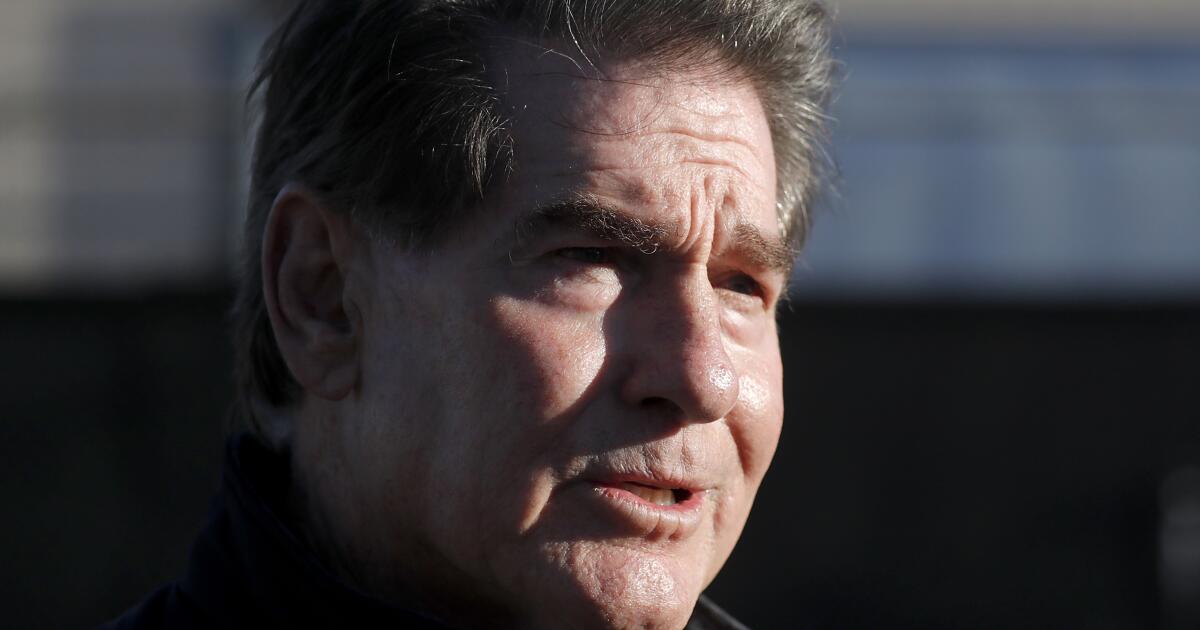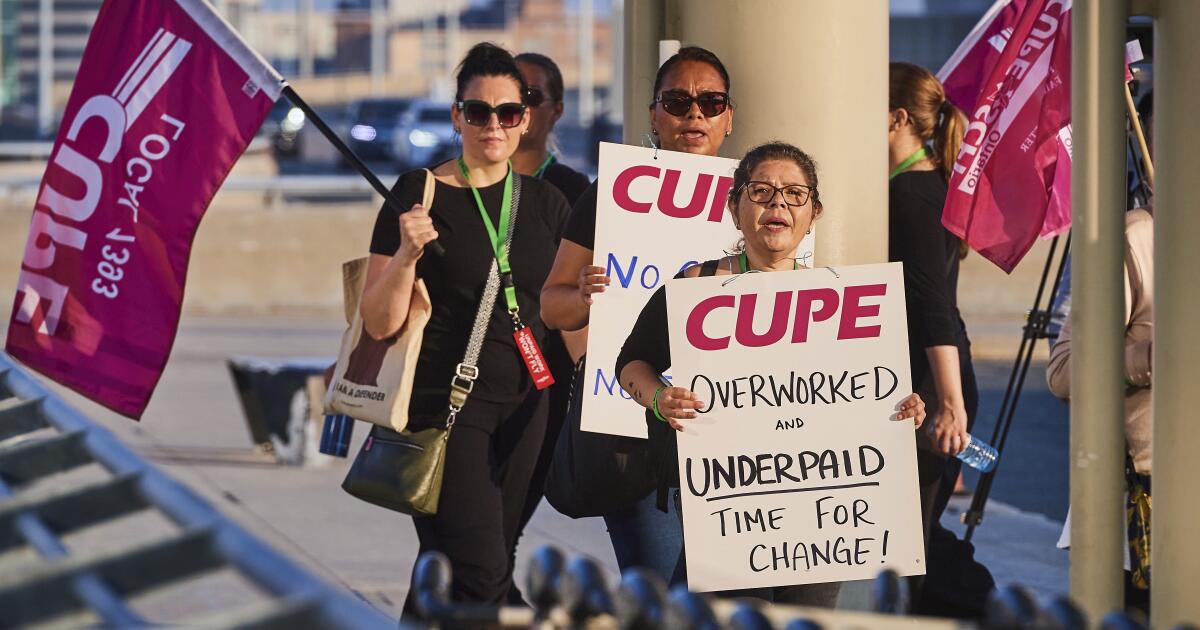Kamala Harris is making history once again, this time in a way few could have imagined.
She has already blazed a trail: as San Francisco's first district attorney, California's first attorney general, the second Black woman elected to the U.S. Senate and, of course, the country's first Black, Asian and female vice president.
Now, at a pivotal moment in American history, Harris, a 59-year-old Democrat, is poised to become the Democratic nominee for president, following President Biden's exit from the race on Sunday.
Kamala Harris greets supporters on election night after winning her race for the U.S. Senate in 2016.
(Barbara Davidson/Los Angeles Times)
Biden, 81, plagued by concerns about his age and electability, dropped out of the race — a decision Harris called a “selfless and patriotic act” — and endorsed his second-in-command.
If nominated at the Democratic National Convention in Chicago next month, Harris will become the first woman of color to lead a national ticket and, if she wins, the first female president.
“There are 107 days until the election,” Harris said in a statement Sunday. “Together we will fight. And together we will win.”
Nonprofit fundraising platform ActBlue said that as of 6 p.m. PDT Sunday, $46.7 million had come in from grassroots supporters in the hours since Harris launched her campaign.
Harris, who publicly endorsed Biden amid calls for him to resign after his disastrous performance in a June debate intensified criticism that he was too old and frail to serve four more years, takes on her new role at a time of great upheaval and tension within the Democratic Party.
He will undoubtedly face fierce attacks from Republicans, who have united behind their nominee, Donald Trump, the twice-impeached and criminally convicted former president who narrowly survived an assassination attempt two days before the start of last week's Republican National Convention.
“I will do everything in my power to unite the Democratic Party — and unite our nation — to defeat Donald Trump and his extreme Project 2025 agenda,” Harris wrote on social media platform X, referencing the 900-plus-page manifesto written by conservative thought leaders and Trump acolytes.
California Gov. Gavin Newsom, long considered a political foe of Harris whose rise as a Democratic star in the Bay Area paralleled his own, wrote Sunday that the vice president is “tough, brave, tenacious.”
“With our democracy at stake and our future at stake, no one is better able to lead the case against Donald Trump’s dark vision and guide our country in a healthier direction than Vice President @KamalaHarris,” she posted on X.
Harris, a former prosecutor, is a product of the same rough-and-tumble Bay Area politics that produced some of the country's most prominent Democrats, including Newsom, former House Speaker Nancy Pelosi and former U.S. Sens. Dianne Feinstein and Barbara Boxer.
She has demonstrated tenacity throughout her political rise, from her successful 2003 campaign for San Francisco district attorney, in which she defeated an incumbent Democrat and her former boss, to her failed 2020 presidential campaign, in which she fiercely criticized Biden on the debate stage for his record on desegregation and school busing.
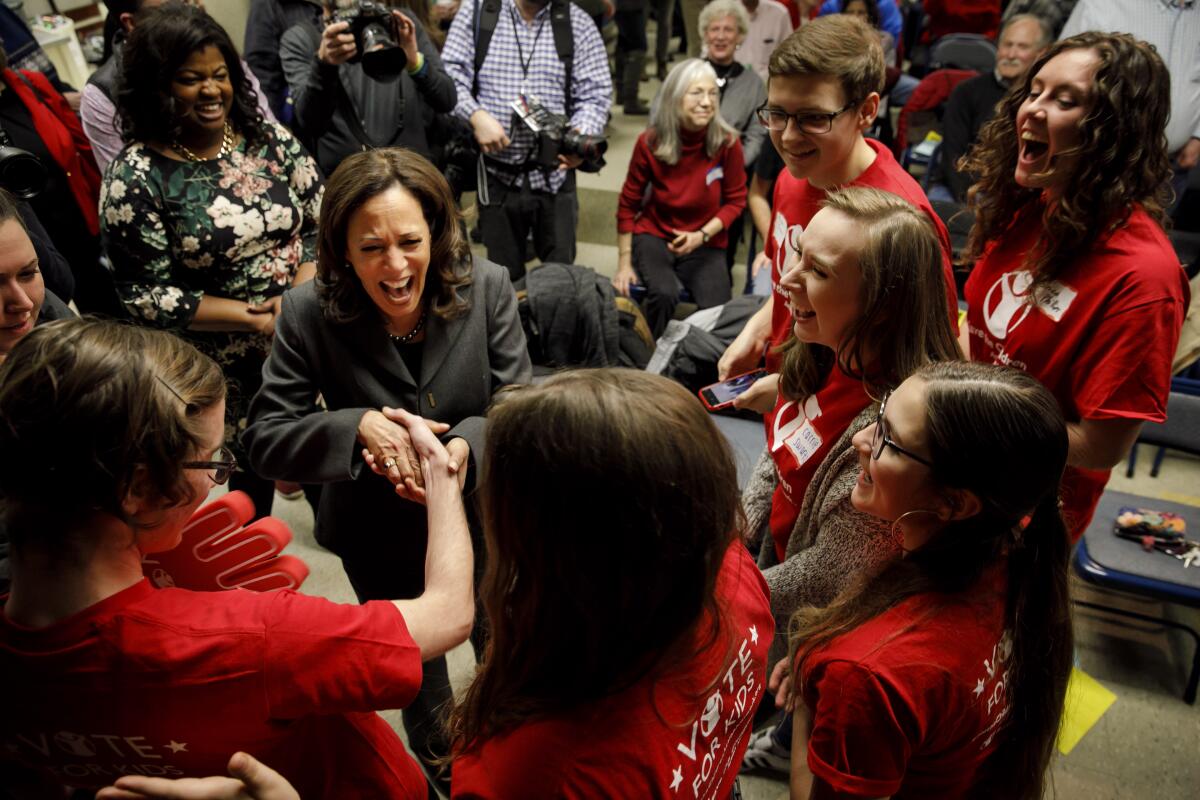
Then-Senator Kamala Harris at an event in Ames, Iowa, in February 2019.
(Marcus Yam/Los Angeles Times)
But she has also been criticized for being too cautious and unwilling to take a stand on controversial issues.
“His 2020 campaign did not exactly inspire confidence,” said Jim Manley, who spent decades in the Senate as a top leadership adviser. “What’s more disturbing is that as the campaign began to wind down, it was rocked by infighting and a tremendous amount of finger-pointing.”
Manley said that while Harris “has to play her cards absolutely perfectly” and do a better job of communicating, “she’s strong enough to pull it off, and that’s why the Trump people are getting nervous.”
Born in Oakland in 1964, Harris is the daughter of two immigrant graduate students. Her late mother, Shyamala Gopalan Harris, was a cancer researcher from India; her father, Donald Harris, was an economist from Jamaica.
Harris's parents divorced when she was 7, and her mother became the primary caregiver and dominant influence for her and her younger sister, Maya.
“There is no title or honor on earth that I treasure more than to say that I am the daughter of Shyamala Gopalan Harris,” she wrote in her 2019 memoir, “The Truths We Hold: An American Journey.”
After college, he worked as a prosecutor in Alameda County and San Francisco, where he made his first foray into politics when he ran for district attorney and overcame major odds to defeat Democratic incumbent Terence Hallinan.
During the campaign, she positioned herself to the right of the fiscal progressive, as a pro-law and order candidate. With one exception: she made it clear during the campaign that she was against the death penalty.
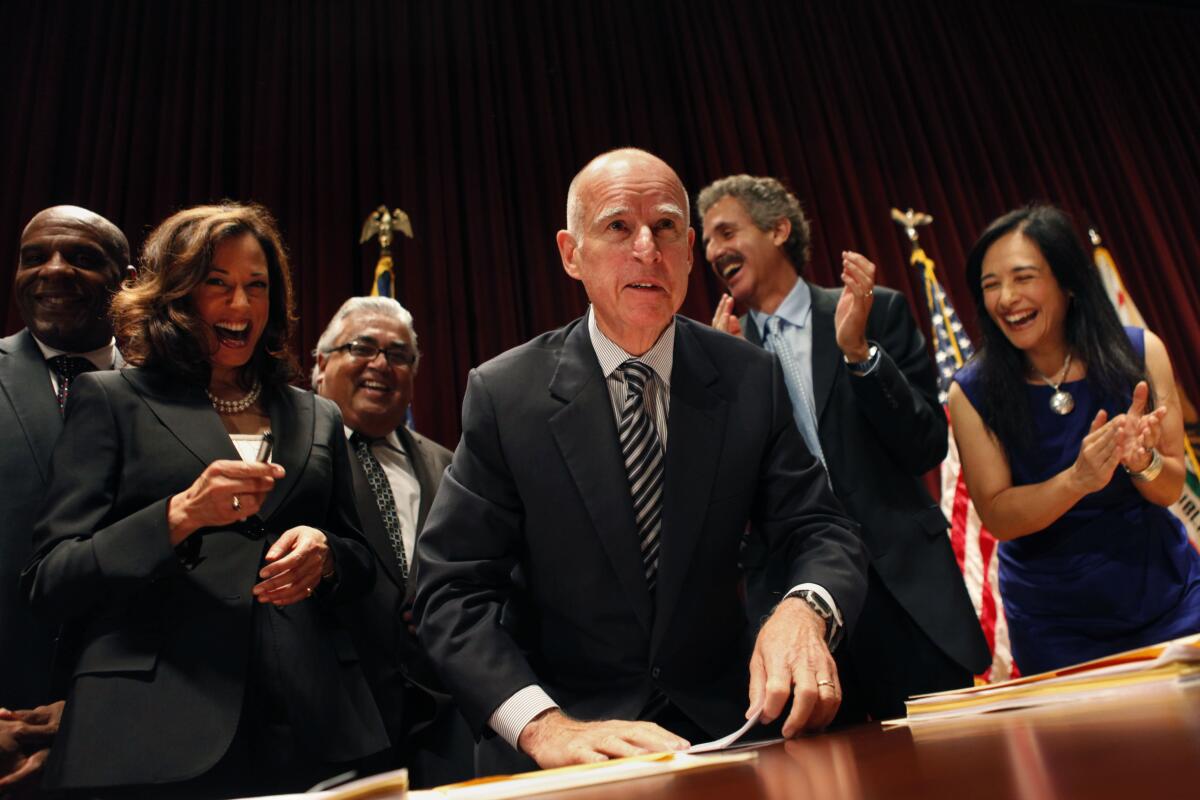
Then-California Attorney General Kamala Harris with Gov. Jerry Brown in 2012.
(Patrick T. Fallon / For The Times)
Four months after Harris was elected, San Francisco police officer Isaac Espinoza was shot and killed by a suspected gang member with an AK-47 while on patrol in the city’s Bayview district. Shortly after Espinoza was killed, but before he was buried, Harris said she would not seek the death penalty in the case.
Harris attended the funeral at St. Mary’s Cathedral, as did then-Senator Feinstein, then-California Attorney General Bill Lockyer and hundreds of police officers. With Harris sitting in a front pew, Feinstein and Lockyer demanded that the attacker face the death penalty.
“She received an incredible amount of criticism,” said Dan Morain, author of the 2021 biography “Kamala’s Way” and a former Times reporter. “I think that episode made her more cautious about taking public positions on very controversial issues.”
Years later, as attorney general, Harris worked in the courts to defend the death penalty in California despite her personal opposition, putting her at odds with progressive criminal justice reform advocates and fueling the perception that she was indecisive.
But as attorney general, he also gained national attention for refusing to defend Proposition 8, the California ballot measure that banned same-sex marriage — a political risk that boosted his political profile and helped pave the way for massive cultural change.
In a diverse California, and as she rose on the national Democratic stage, Harris’s multiracial background was a political asset that invited comparisons to former President Obama. Harris created her own multiracial nuclear family when, in 2014, she married Doug Emhoff, a white entertainment lawyer from Los Angeles, and became a stepmother to his two children, Cole and Ella, earning her the nickname Momala.
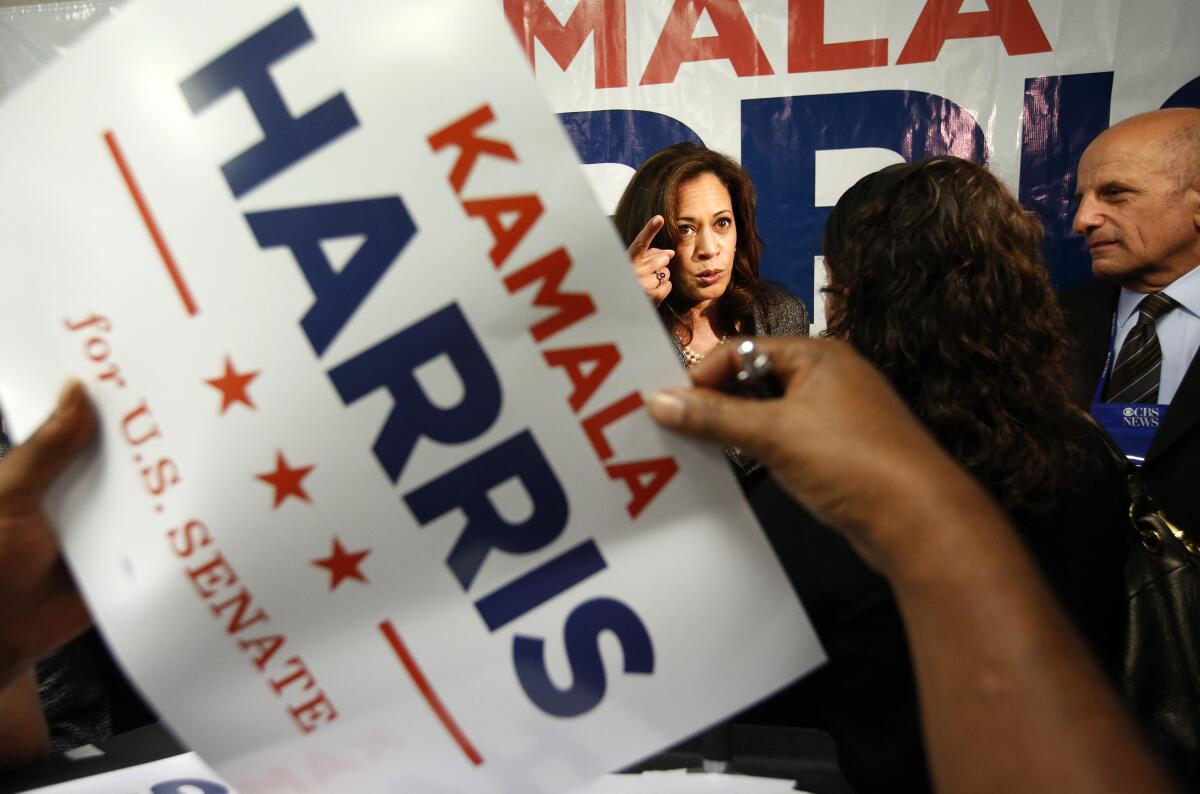
Harris is running for the U.S. Senate in 2016.
(Barbara Davidson/Los Angeles Times)
In November 2016, Harris, with the support of Obama and Biden, won the election to the United States Senate, becoming only the second black woman to do so.
But his decisive victory was overshadowed by the election of Trump, whose loss to Democrat Hillary Clinton stunned members of both parties. In a speech to supporters on election night, he said: “When we are attacked and when our ideals and our core ideals are attacked, do we stand down or do we fight? I say we fight!”
The Trump era gave her an even greater rise to fame. In the Senate, she brought her skills as a prosecutor to hearings. She grilled conservative Supreme Court nominee Brett M. Kavanaugh so forcefully that videos of her performance spread across social media as a kind of audition tape for his 2020 presidential bid.
His then-presidential bid quickly fizzled as he failed to distinguish himself in a crowded Democratic field and his campaign was hampered by staff infighting and weak messaging.
Still, he made a dramatic impression during a Democratic debate, attacking Biden for working with Senate segregationists decades ago to oppose school busing.
“There was a girl in California who was in the second class to be integrated into public schools. She was bused to school every day,” she said. “And that girl was me.”
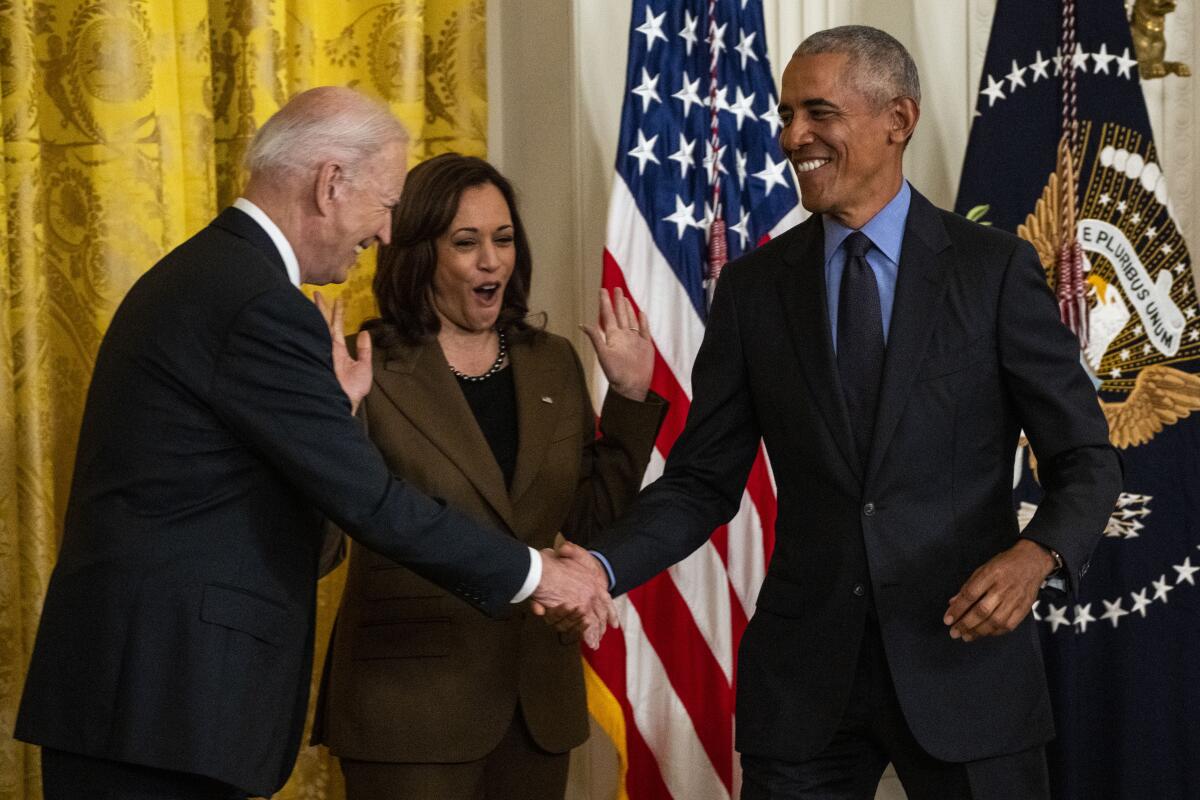
Harris joins President Biden as he greets former President Obama at a White House event in 2022.
(Kent Nishimura/Los Angeles Times)
When Biden and Harris were elected together the following year, Harris, dressed in sportswear, was filmed calling to congratulate Biden in what became a viral moment when she said, “We did it, Joe.”
As vice president, Harris was closely watched by the media and her fellow Democrats, both because she was a barrier-breaking figure and because of Biden's advanced age and highly questionable prospects for a second term.
Not all of the recognition she received was flattering. Critics said her early staff turnover was a sign of weakness in her management style. Supporters said that as a woman of color, she was the victim of a double standard, and was scrutinized more than her white male predecessors.
“She is underestimated. There is more than one layer there,” said Morain, the biographer.
Sen. Laphonza Butler (D-Calif.), who has known Harris for 14 years and served as an adviser on her failed 2020 presidential bid, said she had seen the vice president navigate many political minefields.
“She is a woman who literally works to bring people together,” Butler said. “And even when the criticism is about her, she works diligently to find themes and even concepts in that criticism, to bring unity and agreement.”
Times staff writer Faith Pinho contributed to this report.

